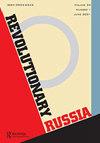State Building Under Occupation. Pavlo Skoropadsky’s Hetmanate in 1918
IF 0.2
2区 历史学
Q2 HISTORY
引用次数: 2
Abstract
Pavlo Skoropadsky was the leader of the ‘hetmanate’–a short-lived puppet state dependent on Germany that was also the first independent Ukrainian state in the twentieth century. His dictatorship serves as a case study to highlight the distinctive features of Ukrainian state building under occupation in 1918. The article examines three aspects of Skoropadsky’s reign in order to highlight the obstacles and circumstances of post-imperial state building under occupation. Focusing on the circumstances of Skoropadsky’s rise to power, his propaganda strategy, and his agrarian reform project, it will show how the Central Powers not only enabled Skoropadsky’s rise as a dictator but also how this attempt at state building defies the traditional framework of national and socialist state building after 1917.被占用的国家建筑。帕夫洛·斯科罗帕德斯基1918年的战争
帕夫洛·斯科罗帕德斯基(Pavlo Skoropadsky)是“帝国”(hetmanate)的领导人,这是一个短暂的傀儡国家,依赖于德国,也是20世纪第一个独立的乌克兰国家。他的独裁统治是一个案例研究,突出了1918年占领下乌克兰国家建设的鲜明特征。本文考察了斯科罗帕德斯基统治时期的三个方面,以突出占领下后帝国主义国家建设的障碍和环境。着眼于斯科罗帕德斯基上台的环境、他的宣传策略和他的土地改革计划,它将展示同盟国如何不仅使斯科罗帕德斯基崛起为独裁者,而且这种国家建设的尝试如何违背了1917年之后民族和社会主义国家建设的传统框架。
本文章由计算机程序翻译,如有差异,请以英文原文为准。
求助全文
约1分钟内获得全文
求助全文

 求助内容:
求助内容: 应助结果提醒方式:
应助结果提醒方式:


